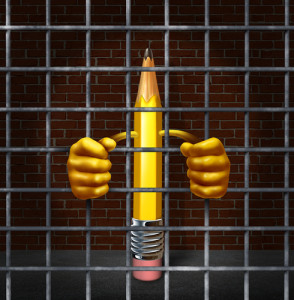Have you ever sat in front of your word processor, waiting in vain for words to flow? How can a writer reclaim her creative muse when her “boys in the basement” go radio silent?
This topic–breaking through writer’s block–is of particular interest to me. I’m one of those people who alternates between periods of intense, almost compulsive creative activity, and long stretches of floundering in a creative trough. So it was very heartening to read that science offers strategies that can help people like me produce more consistently.
Rewiring the brain
In an article published in WD in 2012, Mike Bechtle argued that mere willpower is not the most effective solution for breaking through writer’s block. He suggests that we rewire our brains to get back into the “flow”.
Here were my major takeaways from Bechtle’s article:
- Write first thing in the morning, when alertness and energy levels are typically at their highest. (My note: If you can’t write first thing in the morning, try to write at the same time of day every day. Your brain will “learn” to kick into gear at its regular writing time)
- Fuel your brain with a nourishing breakfast (Think eggs and fruit, not an apple fritter)
- Limit distractions (Don’t check email or messages before writing, and don’t read a newspaper, turn on the TV, or listen to radio, either)
- Keep writing sessions short (The brain can focus intensely for only short periods of time, according to Bechtle)
- Apply glue to butt (Stay seated while writing, that is!)
- Don’t set your expectations too high
Other strategies
In my first foray as a fiction writer back in the 90’s, I was a contract writer for the Nancy Drew series. The schedule for those books gave me little leeway for writer’s block. As soon as the chapter outline was approved, writers were given six weeks to complete the novel. Six weeks! I had to write those stories so fast, I felt as if I was hurling words at the word processor. Every project was a race to the finish line. “Writer’s block” was a foreign concept.
Then my editor left, and the publishing landscape changed. I stopped writing NDs and began to vaguely contemplate writing something on my own. Inertia quickly set in. Months became years, and I hadn’t written anything new.
15 minutes a day, that’s all we ask
I happened to read an article by Kate White, who is an author and former editor of Cosmopolitan Magazine. Her advice to getting started? Write 15 minutes per day, first thing in the morning. No. Matter. What.
To act on Kate’s suggestion, I had to set my alarm for five a.m. instead of six. That extra hour gave me enough time to down a cup of coffee and generate 15 minutes of quality writing time, before I headed off to my day job.
White’s advice worked for me. Fifteen minutes of writing daily eventually became an hour. Soon I was producing a minimum quota of a page a day. (Yes, I know: a single page a day isn’t impressive as a quota. See the last bullet point of the previous list about lowering expectations.) A few months later, I had completed the first draft of my new novel.
Your strategies for breaking a creative logjam?
How have you broken through a creative dry spell in the past? Any tips you can share with the rest of us?


Although I’m almost sure I could retrain my brain, my creativity is at its worst in the early morning hours. I do exactly the opposite of what your article suggests. I deal with email, a quick pass through blogs, social media, etc., and get rid of anything that’s going to distract me. My first writing task will be to look at the notes I made on the scene I finished (assuming it’s finished) when I read it before going to bed, and then fix it. I find this puts my head back in the story. When I’m truly stuck, I try to figure out why. Am I missing a piece of research? Did I write myself into a corner? I’ll use that time to go back through the manuscript and fill in my placeholders, do some cleanup, find better words, play some ‘what if?’, but I tend to write into the mist, and my creativity seems to do its thing in the afternoon and evening. I’m not afraid to write drivel; I can fix it later.
Ah, interesting, Terry. You must be a night owl. I think as long as one tries to settle down to writing at the same time each day, the “brain training” benefits will kick in. Thanks for stopping by!
Good reminders, Kathryn. Early on I decided to always try to write first thing, and get a “nifty 350” (words) done before anything else. It helps to leave off the previous day’s work in the middle of a sentence or scene.
Also, don’t forget exercise!
Exercise is one of those miracle cures, you’re right, Jim! Pardon me while I dash off for a quick run, lol!
Good advice. I write best in the morning, Kathryn, but I have to be careful to avoid time sucks like Facebook, Twitter and e-mail. Those really drain creative energy.
And binge-watching movies, Elaine–that’s one of my really bad habits!
I listen to my brain when I feel myself succumbing to distractions or procrastination. I firmly believe my mind is trying to tell me something is derailing my WIP in plot of character motivation. So I give in and let my mind wander. Christian Slater movies have helped, believe it or not. (Can’t believe I admitted that…again.) Sometimes a good night’s sleep does it.
I love Bruce Willis movies, Jordan–what’s THAT about, lol!
I do my best writing in the morning so I tackle it first and schedule the rest of my day around it as often as possible. With the heat climbing, I’ve bumped the writing back a bit to get a run in first. Typically write for 1.5 hours, take a break for a shower to recharge the brain, and back for some more. A short nap, and then to work.
Sounds like you have the perfect approach, Paul. Please set up a service to get the rest of us off our duffs and into the writing chair!
Pingback: Best Fiction and Writing Blogs | M.C. Tuggle, Writer
These are very helpful guides for getting into the groove.
Thanks for visiting, Mike!
Pingback: Top Picks Thursday 06-18-2015 | The Author Chronicles